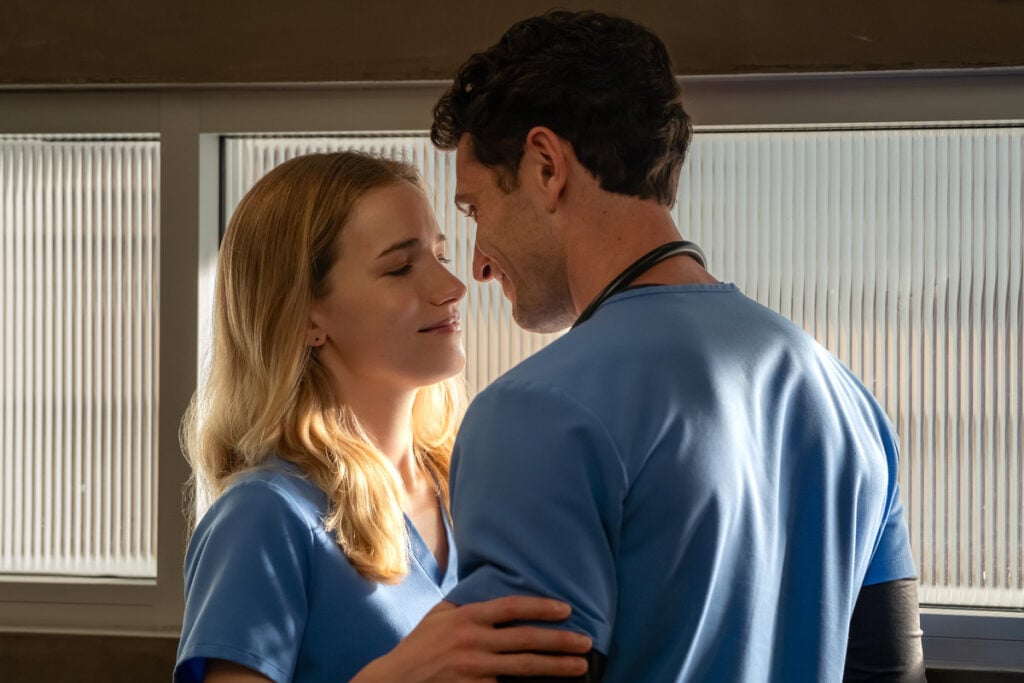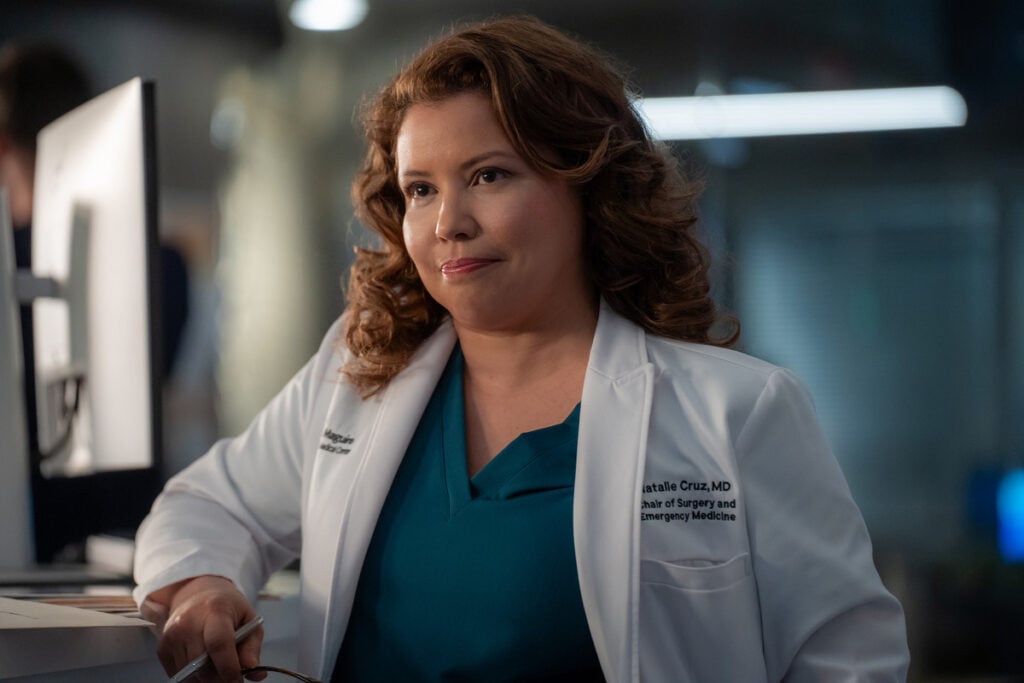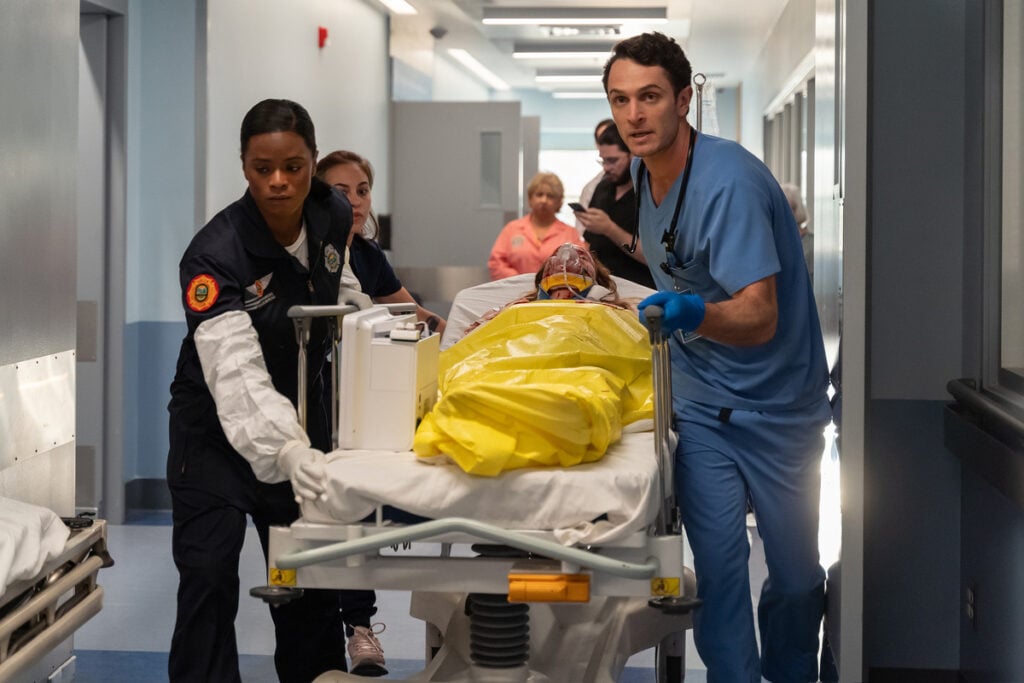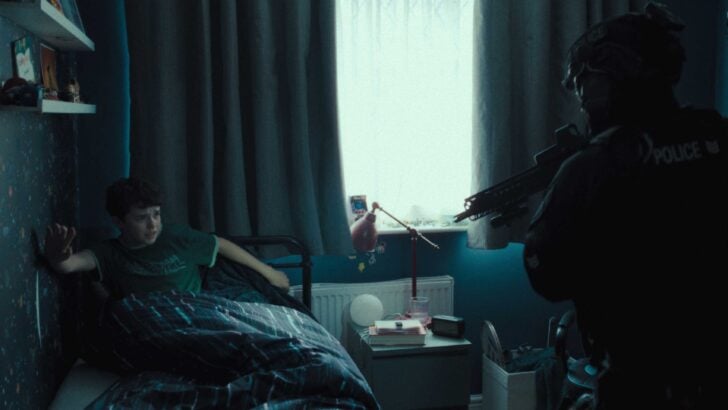What happens when you have a pulse but no real heart?
Well, that’s what you get with Netflix’s medical drama Pulse. It’s a serviceable binge and tepid offering to the medical drama genre, but it also fits into the Netflix vibe well enough.
Pulse is what you would get if Netflix created its own rendition of Grey’s Anatomy and bothered to address the ethical and relationship issues that have been pervasive in that series for two decades.

For that alone, I give Pulse kudos. It recognizes that there is a significant amount of drama to mine by unpacking some of the most problematic elements of soapy workplace relationships.
For Pulse, an entire season-long arc is devoted to the toxic relationship between Danny and Xander, the power dynamic at play, how it affects the mind, and its ripple effects on everyone in the workplace.
While beneficial at times, Xander’s nepotism also finds itself under the scope, especially by the end of the season when even one of his closest allies can see things for what they are when recognizing his family’s reach.
The series doesn’t romanticize doctor-patient mutual attraction and romance, at least not without firmly addressing why it’s a terrible idea when it all comes to a head by the end of the season.

Fortunately, it also tackles things like the hazing and hierarchical system that can be toxic — how there is no glory to be had in being an asshole to those “beneath” you, as working in the medical field, especially as a teaching hospital, is a collaborative experience.
Pulse tackles many of these bits, the majority of which fall at the heart of the series, especially Danny and Xander’s relationship.
It’s what most of the season revolves around, making it the most prominent storyline, but it’s also where Pulse frustrates more than scintillates.
We have the glitz and glam of Miami, something the series goes out of its way to hit home even when most of the season takes place in the hospital.
I briefly appreciated how effortlessly nearly all the characters slipped into Spanish and even the degree of Spanglish used because if you’ve ever been to Miami, that’s a natural occurrence.

However, it felt more forced than natural about midway through the season. I’d listen to Justina Machado read the phone book in English and Spanish, which is why the try-hard nature of reminding us of her bilingual status was a bit irksome.
At least with her daughter and Néstor Carbonell, who I’ve obsessed over since my original favorite medical drama, Lifetime‘s Strong Medicine, it felt more organic.
But that’s generally where Pulse struggled throughout the season. Admittedly, it’s coming into the fray when we’ve been inundated with a surge of medical dramas.
We have brilliant ones like The Pitt, which few can match, and compelling series like Doc, which has strong character work along with its hook.
Pulse getting lost in a sea of medical dramas isn’t doing itself many favors and doesn’t distinguish itself much.

It mostly comes across as a bunch of primarily pretty people playing dress-up as doctors. Pulse leans heavily into the soapy nature of everything but still earnestly tries to masquerade itself as a medical drama, which results in an unusual and, at times, imbalanced series.
Offhand, most of the characters aren’t particularly likable or even compelling. If I had to choose a halfway decent all-around character, it would be Elijah, but he also suffers from pining after his best friend.
As a lead, Danny isn’t exciting, and she has her moments when she’s genuinely offputting, but the situation she finds herself in isn’t totally unrelatable, so that helps.
She’s a great doctor who, like many in her age range, suffers from a terrible bout of Imposter Syndrome. We spend most of the season with her second-guessing or trying to prove herself in some scenario or another.
It made her the perfect person to latch onto for dreamy nepo baby Xander Phillips. He acknowledged and saw her brilliance, nurtured it well, but couldn’t keep his hands off her either.

My confusion often lies in whether Pulse wants us to see Xander Phllips as a self-absorbed, entitled predator or a poor, misunderstood, rich kid. Pulse never actually reached a conclusion on that.
Xander has the dreaminess of a young Tony Goldwyn, but outside of that, I find him an insufferable, transparently manipulative, and pushy character.
As Danny’s authority figure, he was an expert at sending her mixed signals, flirting, and pushing boundaries at every conceivable turn. When she initially resisted him and wanted to stand firm on boundaries and draw a line, he ignored that and persisted.
It was rather uncomfortable to watch how disarming he was and his ability to push to the degree he did and eventually get his way. They would partake in this toxic dance via flashbacks.
As a side note, Pulse relies too heavily on flashbacks as a storytelling device and doesn’t distinguish them well from the present, which is frustrating.

We watch Xander do this give-and-take bit, lifting Danny up and cutting her down if he feels she is outshining him. There was a general sense that whenever she did well, it was because he nurtured that or allowed it to happen.
He shot down every suggestion that they go to HR and address their relationship correctly. He only cared about publicizing things when he felt it was to his benefit.
The entire time, he didn’t even consider how their relationship or his having a say and influence over who would be the next chief resident could impact Danny’s career.
It was bad enough that she’d have to deal with the typical sexism in the workplace, where women always suffer the most in relationship fallout. But there was the added layer of his power as the wealthy son of the hospital’s biggest donors, who had so much influence.
Xander isn’t a naive child. He knows how the world works, and finding out the truth about what happened at his hospital didn’t make him more sympathetic but further proved that his willful ignorance about Danny’s feelings sucked.

If he knew his parents would cover his and their tracks from their actions at the previous hospital, why would he be so aloof about how his mother could ruin Danny or the rest of the hospital when she got word of the HR complaint?
At some point, even Elijah can express his frustration over Xander’s ignorance and inability to see beyond what he wants in all matters. That came after most of the season, with Elijah flailing to decide whether he was supporting Danny or hurt by her.
Pulse attempts to add some nuance to this inappropriate relationship and HR issue when we learn that Danny wasn’t just filing against her superior for being inappropriate but her ex-lover and roommate she willfully got into a relationship with.
As a result, they color Danny in shades of gray as they attempt to nuance the scenario, mainly to avoid making everyone look terrible for picking sides or explicitly defining Xander as a villain.
Because Danny had a role in their toxicity, too, and things aren’t as clear-cut when you’re in an active relationship with the person you’re reporting.

Even that, Pulse goes back and forth on as if they can’t quite figure out if Danny had a right to act as she did, and that’s where it takes a unique enough premise and squanders it with the indecisiveness and fear of painting any of its characters in too poor of a light.
Pulse tries to backtrack on some of Danny’s feelings by layering in her troubled relationship with her father and, at times, contentious dynamic with her sister. Maybe she’s confused about love and how to receive it or show it because of her background. Maybe she’s afraid—the usual angst.
Meanwhile, the chief drama was only to add to Danny’s concerns about the impropriety of their relationship, but it mostly felt contrived.
By the end, Danny didn’t even seem to want the position, and around the time she dropped the HR complaint, she was even considering embracing a firing if it meant maybe getting to have a clean slate with Xander.
By the end of the season, I didn’t even know how I was supposed to feel about Danny or if she even grew in any capacity. And the dynamic with Xander wasn’t something I could find enough nuance in to root for in the end.

Taking accountability for once in his life was maybe a great end for him, but there wasn’t much investment in it.
Ironically, the season’s more compelling “bad boy” was Tom Cole. I find him loathsome in many ways, but he, too, had the recovering rich boy background who was desperate to climb the ladder and achieve some status.
But there was something more human about his flaws and issues. Perhaps it was because we saw the softer moments with Nia, his patient with whom he seemed to connect emotionally.
And even in some moments with Cass, there were sparks of something. He used her for most of their relationship, and the one-sided nature wasn’t enjoyable, but he also respected what she had to say, even if he had a terrible way of showing it.
With Tom, we at least saw consistent marks of growth throughout the entire season, and his arc made sense from where he started and ended.

By the time Cass fed him that speech about how he doesn’t have enough currency because he doesn’t treat people well if they can’t do anything for him, you could see how that message hit home.
He understood, and it was something he had become aware of over time in small moments throughout the season.
We mainly saw that with Sophie, whom he treated like crap. I’m glad she finally had the guts to stand up to him.
Sophie was another character with intriguing enough moments, and over time, her burgeoning dynamic with Camila became a highlight among the other messier relationships.

That conclusion shocked me. I fully anticipated a kiss or mutual acknowledgment of romantic feelings, and instead, like Sophie, I felt the blindside of Rodrigo’s existence.
And Harper was interesting in that the series did well, showcasing both how capable she is as a doctor who uses a wheelchair as well as the specific crap she had to deal with from patients and their families because of that.
As a Justina Machado fan, I found Natalie Cruz lacking as a character. There wasn’t much for her to do besides spend one minute playing up to the hospital politics, even in the face of ethical concerns and sexism, or become a victim and casualty of them.
Her most shining presence was amid the hurricane when she had to deal with her daughter’s accident. Ironically, that was the medical highlight of the series as a whole this season.
But outside of that, it didn’t feel like Machado had much to do, which sucks.

Characters like Luis and Cass were interesting and scene stealers when they had the screentime. In some ways, I would’ve liked to have spent more time with them than some of the leading players.
Overall, Pulse is a nice enough binge to scratch an itch, but it’s doubtful you’ll walk away recalling much about it when the credits roll.
And because we have our pick of the litter for the genre these days, that’s not enough.
Over to you. Did you enjoy Pulse? Which storyline intrigued you the most? Let’s hear all of your Pulse thoughts below!
Watch Pulse Online

Pulse Review: A Soapy Medical Drama with No Real Heartbeat
Pulse is a soapy spin on the genre that explores ethical concerns, forbidden romances, and hospital politics. Read our review!

The Sex Lives of College Girls’ Best Future is on Netflix After Max Cancellation
The Sex Lives of College Girls has been canceled, but negotiations are underway for another platform to save it. Netflix should step up.

Netflix’s Adolescence is the Most Riveting Crime Drama of the Year; Nothing Will Come Close
Netflix’s latest crime drama, Adolescence, is riveting and a contender for the best crime drama of the year. Here’s why it’s must-see!

No Amount of Suits Cameos Will Help Suits LA — Here’s Why
Suits LA’s attempts to cling to the Suits franchise aren’t enough to save it, and here’s why they need to back off. We discuss!

Netflix Aims for the Grey’s Anatomy Audience With Broadcast-Like Medical Drama Pulse — When Does It Premiere?
Pulse is coming to Netflix later this year, and the series already looks very reminiscent of Grey’s Anatomy. Get the premiere date here.
TV Fanatic is searching for passionate contributors to share their voices across various article types. Think you have what it takes to be a TV Fanatic? Click here for more information and next steps.
The post Pulse Review: A Soapy Medical Drama with No Real Heartbeat appeared first on TV Fanatic.
Source: TV Fanatic



